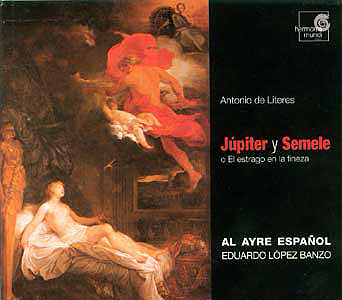Antonio
de Literes (1673-1747) is perhaps the most distinctive voice of
the Spanish Baroque; and although this impressive zarzuela is
only attributed to him, all internal evidence points to it being
his work. Written like Acis y Galatea and Los Elementos
to a text by José de Cañizares, Júpiter
y Semele had the first of several productions on May 9, 1718
at Madridís Teatro de la Cruz, predating Handelís English opera
Semele (never, pace Cristina Diego Pachecoís otherwise
impeccable notes, thought of as an oratorio) by twenty-six years.
Júpiter
y Semele may not rival what is after all one of Handelís supreme
masterpieces, but then it does not aim at the same mark. Where
Handel, greatest of Enlightenment music-dramatists, presents an
operatic range of situations and raw emotions triggered by love
and desire, Literes is more distanced, fashioning a sophisticated
mix of high allegory and low comedy. Spoken dialogue alternates
with sung numbers, ranging from operatic recits and da capo
arias down to comedy dúos al español in the
fast-moving manner of the baroque zarzuela. The scoreís variety
is a delight, not least for the energised choral epigrams which
frame several of the scenes.
Character
and psychology are not Literesí prime concerns; but Semele herself
- unusually - is a speaking role, and in this atmospheric and
urgent live concert recording (made this February in Literesí
native Mallorca) Virginia Ardid is able to bring an actorís subtlety
and power to her scenes with Jupiter. This makes for some unusual
effects - notably at the catastrophe, where Semele is incinerated
by embracing (as she herself has demanded) the God in his true
fiery form. The alternation of sung and spoken strophes for the
two protagonists makes for gripping drama. Rarely can even Marta
Almajano have given such a towering performance as she does here,
and Jupiterís poised lament after Semeleís death is, fittingly,
the musical highpoint of the performance.
The
villains of the piece, Cupid and Juno, are played with spiteful
verve if less vocal distinction by Lola Casariego and Soledad
Cardoso, contrasted in timbre and working well in tandem. The
supporting singers are generally excellent, though the minor subplot
of King Cadmusís war with Ydaspes suffers from the latterís limitation
as a speaking actor. Eduardo López Banzo and Al Ayre Español
have always played Spanish baroque as if to the manner born, but
thereís an unbuttoned urgency here which makes this their most
rewarding zarzuela performance yet.
Itís
tricked out with instrumental additions from contemporary sources,
and suitable helpings of dialogue. There are good notes as well
as José Cañizaresí elegant Spanish original text,
usefully translated into French and German as well as ... though
Iím not sure English is quite the right word for Mark Owenís rendition,
which makes very little sense and contains a host of howlers.
Itís time he upgraded his translation software or monitored the
results more carefully. The whole is most attractively packaged
by Harmonia Mundi, and altogether Júpiter y Semele
is easily the most vivid recording to date of any baroque zarzuela.
Christopher
Webber
